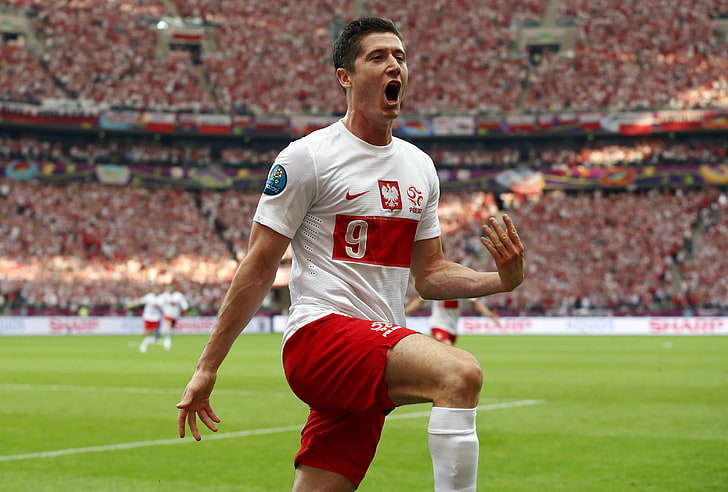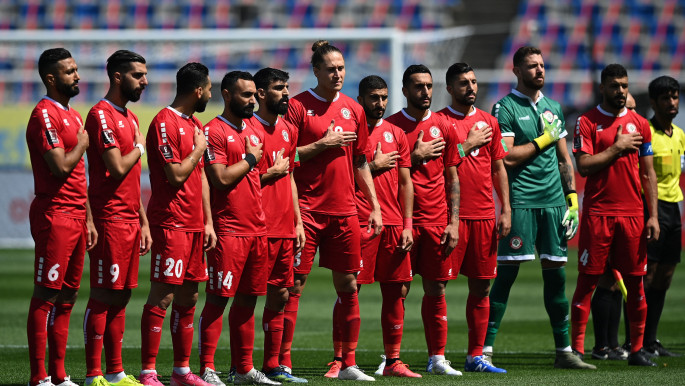Poland's waste, Lebanon's gain - how a failed Polish product is now shining in the Middle East?
Imagine, you're watching TV, where you found a football game, it showed the scenes of Poland, this time wrestling against England as the result was 1-0 for the English in Warsaw. In the end, you expected little, until a header from Damian Szymański salvaged Poland a point and kept the Poles intact with the hope to qualify, at least, by reaching the playoffs. You feel proud and pleased, but at the same time, you could not celebrate loudly because of your own national duty: you will represent a national team with a cedar badge on the jersey.
This is the story of Omar Bugiel, a special member of the national team of Lebanon.
First connection to football
Poland Is Not Yet Lost. Yes, the anthem of Poland, and probably for football fans, the Polish hymn in big stadiums across Europe and sometimes in the world is no longer strange, as Poland is a frequent participant in several World Cup or European Championship. A group of 11 men, carrying white jerseys with the symbol of white eagle on their chest, loudly sing the anthem.
The anthem of Poland is also the story of Omar Bugiel. Born Omar Bugiel in the capital of Germany on 3 January 1994, he is the son of a Lebanese migrant searching for works, and a Polish woman who fell in love, and gave birth to him. In Arabic, he is also known as Omar Khaled Chaaban due to his dad's maiden name. He grew up in Germany for the first ten years, knew only German before moving to the United Kingdom only for learning English purpose. However, one thing changed his mind.
He came watching his classmates playing football, and because of football, he was drawn interests to. Shortly after returning back to Germany in 2005, he enlisted himself into the 1860 Munich camp, thus began his youth experience at the age of 11. After four years, he moved back to the UK, this time, for Chichester City, trying to gain back the passion. But 1860 Munich didn't see Bugiel valuable anymore, and released him at the age of 16.
The year he was released by the German outfit, his motherland Poland was rioting for the upcoming UEFA Euro 2012, with Poland co-hosted alongside Ukraine. Led by then-manager Franciszek Smuda, Poland was injected with a group of new fresh blood, with goalkeepers like Łukasz Fabiański and Wojciech Szczęsny; defenders like Sebastian Boenisch, Łukasz Piszczek and Marcin Kamiński; as well as midfielders and strikers like Adrian Mierzejewski, Rafał Murawski, Ludovic Obraniak, Maciej Rybus, Eugen Polanski, Kamil Grosicki and, especially, Jakub Błaszczykowski and future Best FIFA Men's and UEFA Men's Player of the Year winner, Robert Lewandowski. With these talents, Poland was hoping for a successful European performance, after a dismal show in the 2010 FIFA World Cup qualification that saw Poland finished 5th in their group.
 |
| Representing Poland and playing alongside future superstar Robert Lewandowski was once the dream of Omar Bugiel. |
Omar Bugiel saw the reason to play football was because he expected any future call-up from Germany or Poland. He was hoping to be part of either teams, the more successful Germany, or the less - but still respectable - Poland. But the chance was fading away...
A surprise call from his dad
Then, Poland's Euro 2012 was a complete failure, finishing bottom with two draws. Then, Poland took part in yet another unsuccessful World Cup cycle, this time for Brazil 2014.
Did it matter now? No, nothing. Bugiel spent much of his early professional career languished in the lower division of English football. By that time, he has fallen in love to the UK, speaks fluent English, but the chance to play for either Germany or Poland was dashed.
Meanwhile, Omar's father began noticing that several football scouts from his ancestral Lebanon has begun to search for players of Lebanese descent. It came also after the qualification for Brazil 2014, which Lebanon, despite failed to qualify, got the best performance ever in a qualifier, beating South Korea and Iran, reaching the final round. He was reluctant to appreciate, but later on, after the officials from the Lebanese Football Association decided to make a contact, he could not resist. Bugiel's dad wanted Omar to choose Lebanon.
But, what does Lebanon offer?
It is hard to answer. Lebanon, compared to Poland or Germany, has little to none. Germany has won four World Cup and three Euros, Poland at least qualified for three Euros and finished third in two World Cup; meanwhile Lebanon, by the time Omar's dad phoned, contested only in one major tournament, the 2000 AFC Asian Cup, which Lebanon was hosts. The Lebanese didn't progress from the group stage, winning only two points. Lebanon did have good players to play in Germany, the country where Omar grew up though, notably Roda Antar and Youssef Mohamad, the latter was the first Asian to captain a German club, when he did with Cologne. Yet their contributions weren't sufficient to keep Lebanon afloat.
 |
| Lebanon was where Omar Bugiel got a change in his career. |
Roda Antar and Youssef Mohamad aren't Marco Reus, Mario Götze, Jakub Błaszczykowski or Robert Lewandowski. Lebanon was already facing an economic and social upheaval that would go on uprooting the country in 2018, and Lebanese football was going to chaos. Without financial supports, the Lebanese Football Association had to plea players from the diaspora to return. Omar Bugiel was among one of the people agreed to it, when he accepted a call-up in May 2017, in the Asian Cup qualifiers against Malaysia away. It wasn't long for him to represent Lebanon, as he debuted in the team's 1-0 friendly win over Singapore in 9 November the same year. Well, it appeared that he finally got a right decision - if he still tried for Mannschaft or the White Eagle, neither would approach him.
First recognition
The dependence on diasporic footballers revealed even clearer in the Lebanese side: when Lebanon qualified for the 2019 AFC Asian Cup, its first in 19 years and the first in a qualifying cycle, nearly a half of the Lebanese team was born or raised abroad, Omar Bugiel included. Polish and German media paid little attention, thus they knew nothing about Bugiel's Polish background and German ethics. And with Bugiel not included to the 2019 Asian Cup squad, he was virtually unknown. Even the early phase of the 2022 World Cup qualifiers in Asia had failed to attract media from Poland or Germany.
Still, Bugiel would have a debut, an away game against North Korea in the 2022 FIFA World Cup qualification, but this ended with an agonising 0-2 defeat. Lebanon subsequently failed to defeat the same opponent at home, and Bugiel was expected to be left out, from radar.
Yet, the COVID-19 pandemic saw North Korea, which shared the same group with Lebanon, withdrew, despite FIFA's attempt to convince the Fat Kim. As for the result, Lebanon got a major relief: its negative record against North Korea was removed. Of course, Lebanon's gain was the other's woe - Uzbekistan's poor forms against Saudi Arabia and Palestine cost the country from reaching the last stage, it was the first time that Uzbekistan missed out the final round. By contrast, Lebanon got an important draw from South Korea at home and even shocked the Asian powerhouse with a goal lead away before losing 1-2.
But Bugiel would not come to light until the third round, where Lebanon, the lucky survivor, got a meeting against the UAE. It is notable that the UAE was far stronger than Lebanon, yet after 90 minutes, the Lebanese achieved a deserved draw in Zabeel Stadium, where the UAE staged a successful comeback in the second round. Omar Bugiel made his debut there, replacing Hassan Maatouk in 69'. In the game against South Korea away, yet again, Bugiel came replacing Hilal El-Helwe in 63', as Lebanon, despite brave demonstration, again fell 0-1 by a courtesy of Kwon Chang-hoon. Bugiel wasn't used in October fixtures, where Lebanon stunned by holding yet another Asian powerhouse Iraq goalless before beating neighbour Syria 3-2 to sit third. Although it was temporary, the third place was seen as emotional for many Lebanese. Of course, the road is still long, and far from over.
Omar Bugiel, still, could cherish an opportunity that he never thought to have come. Lebanon is still under a severe crisis, the country's currency is falling free, fuel subsidies have gone out of control and sectarian conflict is looming; but this national team is building hope in a country already ravaged by crisis. Omar Bugiel is simply, going to help achieve the work, even if Lebanon can qualify or not.
Comments
Post a Comment